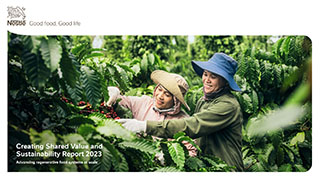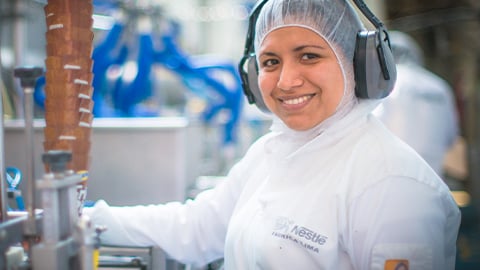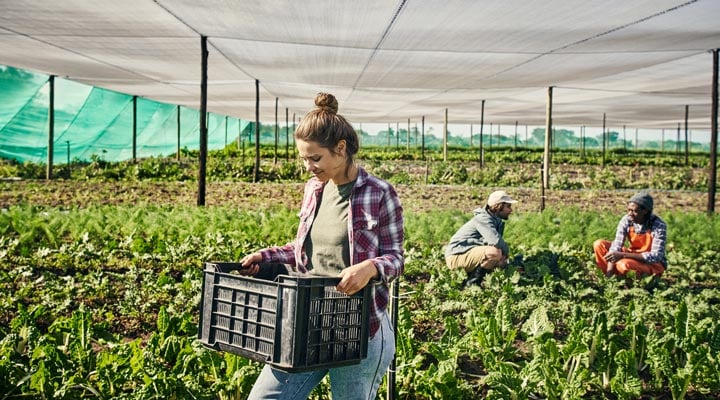Access to affordable and nutritious food

Access to adequate food and a nutritious diet is a fundamental human right.
The United Nations Food and Agriculture Organization estimates that as many as 828 million people are affected by hunger.
Against the backdrop of a growing world population, expected to reach 10 billion people by 2050, the problem will continue to be a challenge. With our global presence, extensive portfolio and R&D expertise, we are well placed to help address these challenges, and in doing so bring tasty and balanced diets within the reach of billions of people.
We focus our efforts on product innovation, by creating affordable staples fortified with micronutrients and by having clear guidance on the nutritional profiles of our products.
Tackling malnutrition for generations to come
Creating affordable nutrition through innovation
More than half of the global population survives on between USD 2-10 per day, so part of our research and development work is focused on creating affordable products fortified with micronutrients. As nutritional deficiencies can vary geographically, reflecting different eating habits, historical, cultural, ethical preferences and religious factors and socio-economic circumstances, it’s vital we make sure such nutrients are locally relevant.
Another important aspect is closing the ‘protein gap’ – this refers to demand for protein that outstrips supply or where what is available is unaffordable to local communities. We are helping by engaging our scientists to adjust processes and recipes and by using local raw materials to develop innovative products using accessible, plant-based proteins which also help to avoid GHG emissions.

Our key actions
- Support 50 million children annually to adopt balanced diets and lifestyles through Nestlé for Healthier Kids by 2030
- Further explore links between regenerative agriculture and improved nutrition
- Halve food waste in our operations by 2030 and accelerate action on SDGs target 12.3 by helping tackle food loss and waste along our value chain
- Guide people towards a balanced diet: Nestlé will strengthen its responsible marketing of indulgent products, in particular those from its confectionery and ice cream categories
- We will ensure that all children’s confectionery and ice cream portions will be 110 kilocalories or less and all multi-serve products from these two categories will have clear front-of-pack portion guidance, where local regulation allows
- These changes will be fully rolled out within the next three years, starting in spring of 2024 in the UK where Nestlé will provide more visually intuitive front-of-pack portion guidance on confectionery
- They come on top of Nestlé’s decision to voluntarily restrict its marketing of confectionery, ice-cream and water-based beverages with added sugars to children below 16 years of age, which came into effect at the beginning of July 2023. Nestlé is one of the few companies that has a policy that restricts marketing to children below 16 years of age
Improving lives in Brazil’s favelas
In Brazil, the Gerando Falcões Fruit and Nut bar was launched in 2022 as Nestlé’s first social product. All profits are destined to help improve the lives of residents from four large favelas in Brazil, in three regions: Maceió, Rio de Janeiro, and São Paulo. To date, sales of the bar have generated B$ 300 million (around CHF 54 million) to help the Gerando Falcões organization improve lives in Brazil’s Favelas.
Tackling iron deficiencies in Pakistan
In Pakistan, where half of children are iron-deficient, we launched Bunyad Iron+, an affordable dairy-based drink fortified with a new source of iron that is three times better absorbed by the body compared with existing sources.
Helping children lead healthier lives
Nestlé for Healthier Kids seeks to spread awareness of healthy eating globally. It is focused on combating malnutrition but also highlights the risks of being overweight and the chronic conditions that can stem from obesity. Its research reveals that children in China only consume 16% of the recommended amount of dairy; 30% of children in Russia do not eat vegetables daily; and 16% of children in the United States skip lunch and miss out on precious vitamins and minerals.
A global network of research and development scientists
Our R&D network comprises 23 locations worldwide and sees our scientists collaborate with leading universities and start-ups to help create more affordable and sustainable nutrition. Our R&D Center for affordable nutrition in Abidjan, Côte d'Ivoire, plays a key role in creating foods that target the needs of vulnerable populations in sub-Saharan Africa – specifically Côte d'Ivoire, Kenya, Nigeria, Senegal and South Africa. It boasts food technologists, scientists, and engineers who specialize in innovation around cereals, dairy, snacks and drinks.
Micronutrient deficiencies carry a terrible cost. Iron deficiency anemia alone impairs millions of children’s physical and mental development. For me, nothing is more rewarding than the work we do to fortify our affordable products with essential micronutrients such as iron, iodine, vitamin A and zinc.


















